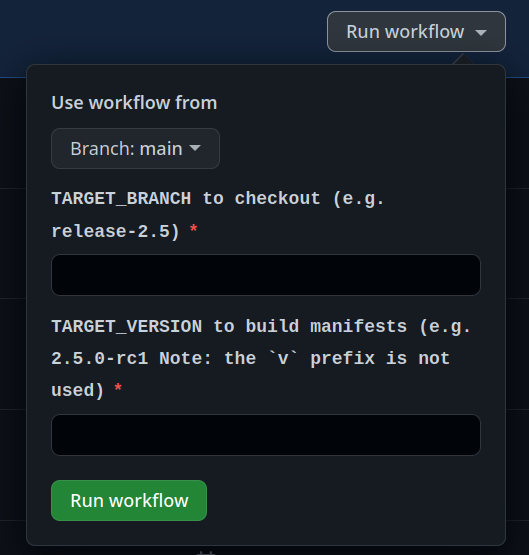github.com/argoproj/argo-cd/v2@v2.10.9/docs/developer-guide/releasing.md (about) 1 # Releasing 2 3 ## Introduction 4 5 Argo CD is released in a 2 step automated fashion using GitHub actions. The release process takes about 60 minutes, 6 sometimes a little less, depending on the performance of GitHub Actions runners. 7 8 The target release branch must already exist in the GitHub repository. If you for 9 example want to create a release `v2.7.0`, the corresponding release branch 10 `release-2.7` needs to exist, otherwise, the release cannot be built. Also, 11 the trigger tag should always be created in the release branch, checked out 12 in your local repository clone. 13 14 Before triggering the release automation, the `CHANGELOG.md` should be updated 15 with the latest information, and this change should be committed and pushed to 16 the GitHub repository to the release branch. Afterward, the automation can be 17 triggered. This will be automated in the very near future. 18 19 **Manual steps before release creation:** 20 21 * Update `CHANGELOG.md` with changes for this release 22 * Commit & push changes to `CHANGELOG.md` 23 24 **The `Init ARGOCD Release` workflow will perform the following steps:** 25 26 * Update `VERSION` file in the release branch 27 * Update manifests with image tags of the new version in the release branch 28 * Create a pull request to submit the above changes 29 30 **The `Publish ArgoCD Release` workflow will perform the following steps:** 31 32 * Build, push, and signs the container image to Quay.io 33 * Generate a provenance for the container image 34 * Builds the CLI binaries, release-notes, and then creates a GitHub release and attaches the required assets. 35 * Generate a provenance for the CLI binaries 36 * Generate and sign a sbom 37 * Update the stable tag when applicable 38 * Update `VERSION` file in the master branch when a new release is GA 39 40 ## Steps 41 42 ### Step 1 - Update Version and Manifest 43 44 1. Ensure that the TARGET_BRANCH already exist. 45 2. Visit the [Release GitHub Action](https://github.com/argoproj/argo-cd/actions/workflows/init-release.yaml) 46 and choose which branch you would like to work from. 47 3. Enter the TARGET_BRANCH to checkout. 48 4. Enter the TARGET_VERSION that will be used to build manifest and `VERSION` file. (e.g `2.7.0-rc1`) 49 50  51 52 When the action is completed a pull request will be generated that contains the updated manifest and `Version` file. 53 54 5. Merge the pull request and proceed to step 2. 55 56 ### Step 2 - Tag Release Branch 57 58 The steps below need to be executed by someone with write access in Argo CD upstream repo. 59 60 1. Checkout the release branch. Example: `git fetch upstream && git 61 checkout release-2.7` 62 2. Run the script found at `hack/trigger-release.sh` as follows: 63 64 ```shell 65 ./hack/trigger-release.sh <version> <remote name> 66 ``` 67 68 Example: 69 ```shell 70 ./hack/trigger-release.sh v2.7.2 upstream 71 ``` 72 73 !!! tip 74 The tag must be in one of the following formats to trigger the GH workflow:<br> 75 * GA: `v<MAJOR>.<MINOR>.<PATCH>`<br> 76 * Pre-release: `v<MAJOR>.<MINOR>.<PATCH>-rc<RC#>` 77 78 Once the script is executed successfully, a GitHub workflow will start 79 execution. You can follow its progress under the [Actions](https://github.com/argoproj/argo-cd/actions/workflows/release.yaml) tab, the name of the action is `Publish ArgoCD Release`. 80 81 !!! warning 82 You cannot perform more than one release on the same release branch at the 83 same time. 84 85 ### Verifying automated release 86 87 After the automatic release creation has finished, you should perform manual 88 checks to see if the release came out correctly: 89 90 * Check status & output of the GitHub action 91 * Check [https://github.com/argoproj/argo-cd/releases](https://github.com/argoproj/argo-cd/releases) 92 to see if the release has been correctly created and if all required assets 93 are attached. 94 * Check whether the image has been published on Quay.io correctly 95 96 ### If something went wrong 97 98 If something went wrong, damage should be limited. Depending on the steps that 99 have been performed, you will need to manually clean up. 100 101 * If the container image has been pushed to Quay.io, delete it 102 * Delete the release (if created) from the `Releases` page on GitHub 103 104 ### Manual releasing 105 106 The release process does not allow a manual release process. Image signatures and provenance need to be created using GitHub Actions. 107 108 ## Notable files that involve the release process. 109 110 | File | Description | 111 |------------------------------------|--------------------------------------------------------| 112 |goreleaser.yaml |Config to build CLI binaries, checksums, release-notes | 113 |.github/workflows/image-reuse.yaml |Reusable workflow used to generate container images | 114 |.github/workflows/init-release.yaml |Used to generate manifest and `VERSION` file | 115 |.github/workflows/release.yaml |Build image, CLI binaries, provenances, sbom, post jobs | 116 |./hack/trigger-release.sh |Ensures all pre-requistes are met and pushes the tag |